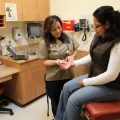
When I joined Center for Health Progress two years ago, we were silent on a topic that is essential to health equity—reproductive health. For many people, including myself, reproductive health care is their main entry point into the health care system. When I was uninsured and living in rural Colorado, I relied on Planned Parenthood for the affordable, quality, and non-judgmental reproductive care I needed to be healthy. Simply put, there is no health equity without reproductive health equity. When women of color and families with low incomes continue to experience striking and preventable reproductive health outcomes, staying silent isn’t an option.
Historically, Center for Health Progress has remained neutral or has not commented on issues that were particularly polarizing or potentially isolating. However, a lot has changed within our organization over the past two years, and we know that silence is a form of complicity. We are taking action and speaking out more to change the values, policies, and practices that create unjust health outcomes and inequitable access to care, especially for those who have historically faced health inequities based on race, income, or ZIP code. Our 2017 Annual Report highlights some of these examples, and Maggie recently explained how we’re shifting our organization’s approach from top-down to the bottom-up. We are also taking a stand at the Capitol, engaging on policy issues that impact Coloradans far beyond the clinic walls; this past legislative session, we worked alongside our partners to pass Senate Bill 108, which improves the driver’s license program for immigrants without documentation.
As we move ahead, we must continue to speak up for issues that affect the communities we care about, including reproductive health. We believe our reproductive health care system should work for all of us and we support a range of services and policies that enable individuals to make healthy decisions about their bodies, sexuality, relationships, and families. This includes (but is not limited to):
- Having safe and satisfying sex lives
- Choosing if and when they want to have children
- Having safe pregnancies and healthy babies
- Having access to family leave that allows each individual to take time off from work to care for their family members
As part of our health equity commitment, we support increased access to reproductive health care services for Coloradans and an increased understanding of reproductive health as an important part of overall health and health equity. We acknowledge that although people of all genders have reproductive health care needs and may face barriers to adequate reproductive health, there is a disproportionate burden on women, and especially women of color. The racial disparities caused by centuries of systemic racism and lack of access to quality, affordable, and timely health care services are undeniable:
- Black women are almost four times as likely to die from complications from pregnancy or childbirth as white women
- Unintended pregnancy rates are highest among low-income women and women of color
- Women of color are less likely than white women to take maternity leave after giving birth
We know that increasing access to the full spectrum of reproductive health care services, including paid family leave, contraception, and abortion, matters. It allows women and families to be healthier and make the best decisions for themselves and their families. It also reduces health disparities, rates of infectious disease, and increases economic and educational opportunities. Actively supporting policies and programs that increase access to reproductive health care services is a tangible way to reduce unjust health outcomes in Colorado and across the nation.
Now more than ever, it is time to speak out on reproductive health, and I'm glad we've progressed enough as an organization to do so. There are incredible organizations who have been in this fight long before us, like COLOR, which works to increase access to reproductive health services and reproductive justice in Colorado. We must support their leadership and work in partnership toward a future where everyone can access the reproductive health care they need to be healthy.




